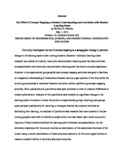The Effect of Concept Mapping on Student Understanding and Correlation with Student Learning Styles
Author
Mosley, William G.
Abstract
This study investigated the use of concept mapping as a pedagogical strategy to promote change in the learning styles of pre-nursing students. Students' individual learning styles revealed two subsets of students; those who demonstrated a learning style that favors abstract conceptualization and those who demonstrated a learning style that favors concrete experience. Students in the experimental groups performed concept mapping activities designed to facilitate an integrative understanding of interactions between various organ systems of the body while the control group received a traditional didactic instruction without performing concept mapping activities. Both qualitative and quantitative data were collected in order to measure differences in student achievement. Analysis of the quantitative data revealed no significant change in the learning styles of students in either the control or experimental groups. Learning style groups were analyzed qualitatively for recurring or emergent themes that students identified as facilitating their learning. An analysis of qualitative data revealed that most students in the pre-nursing program were able to identify concepts within the class based upon visual cues, and a majority of these students exhibited the learning style of abstract conceptualization. As the laboratory experience for the course involves an examination of the anatomical structures of the human body, a visual identification of these structures seemed to be the most logical method to measure students' ability to identify anatomical structures.
Date
2013
Citation:
APA:
Mosley, William G..
(January 2013).
The Effect of Concept Mapping on Student Understanding and Correlation with Student Learning Styles
(Master's Thesis, East Carolina University). Retrieved from the Scholarship.
(http://hdl.handle.net/10342/4250.)
MLA:
Mosley, William G..
The Effect of Concept Mapping on Student Understanding and Correlation with Student Learning Styles.
Master's Thesis. East Carolina University,
January 2013. The Scholarship.
http://hdl.handle.net/10342/4250.
April 24, 2024.
Chicago:
Mosley, William G.,
“The Effect of Concept Mapping on Student Understanding and Correlation with Student Learning Styles”
(Master's Thesis., East Carolina University,
January 2013).
AMA:
Mosley, William G..
The Effect of Concept Mapping on Student Understanding and Correlation with Student Learning Styles
[Master's Thesis]. Greenville, NC: East Carolina University;
January 2013.
Publisher
East Carolina University

